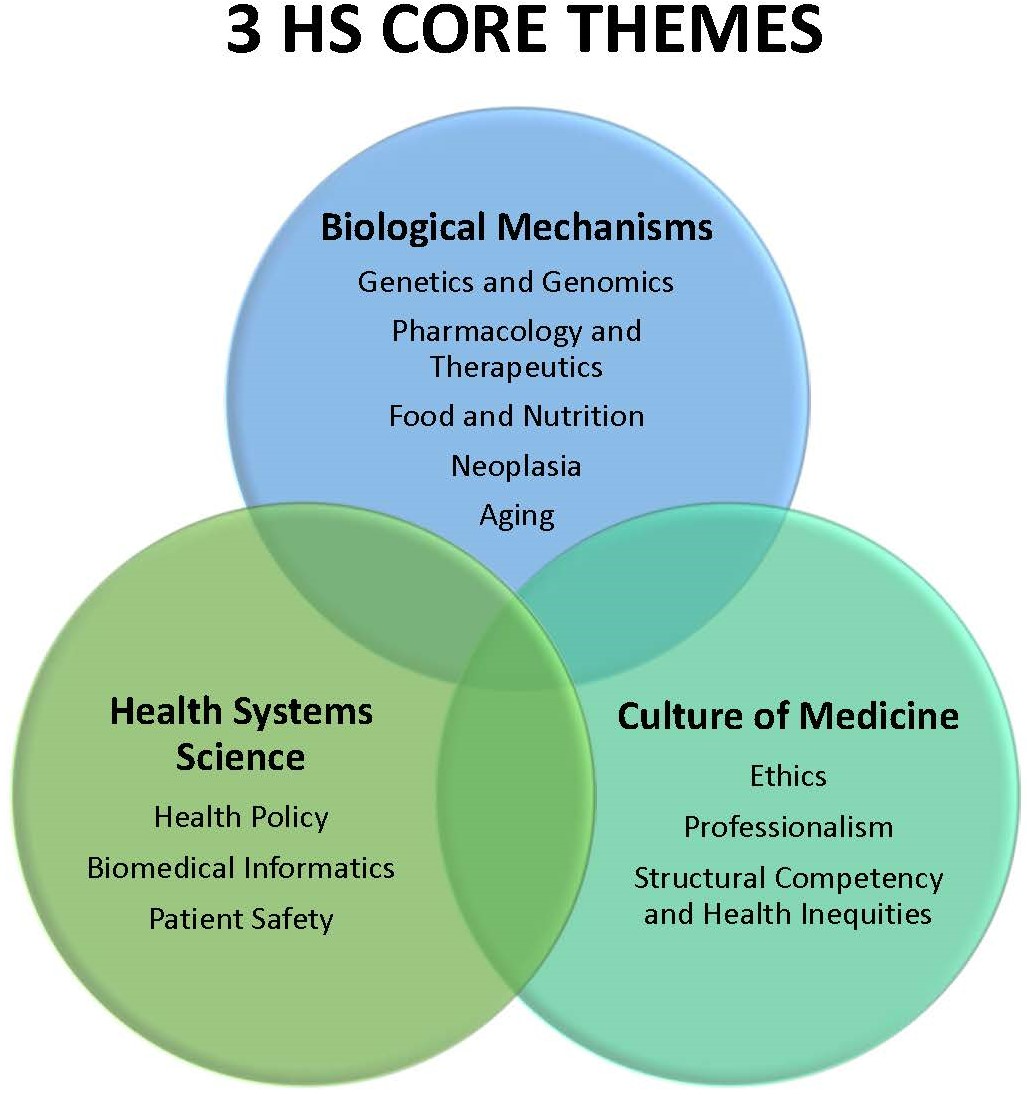-
Joann Norma Bodurtha, M.D., M.P.H.

Expertise: Dysmorphology, Genetics and Inherited Diseases, Pediatrics
Primary Location: The Johns Hopkins Hospital (Main Entrance), Baltimore, MD
Horizontal Strands
The Horizontal Strands (HS) are scientific, social, or clinical themes that are integrated across the four-year M.D. curriculum. The HSs provide a framework on which to base lifelong learning of each content area.
The Horizontal Strands are organized into 3 Core Themes. The 3 Core Themes and their associated content areas include:
- Biological Mechanisms (Genetics and Genomics, Pharmacology and Therapeutics, Food and Nutrition, Neoplasia, Aging)
- Culture of Medicine (Ethics, Professionalism, Structural Competency and Health Inequities)
- Health Systems Science (Health Policy, Biomedical Informatics, Patient Safety)
Integration and monitoring of thematic content areas allow for the evolution of the GTS curriculum to respond to changing societal, scientific, and clinical competencies in the formation of a physician. Each HS has its own overall goals and specific objectives intended to be developmental and reflect planned redundancy.

Biological Mechanisms
The Biological Mechanisms core theme encompasses the fundamental body of scientific knowledge that contributes to our understanding of human health and disease. The Scientific Foundations of Medicine (SFM) covers human anatomy and the basic genetic, molecular, biochemical, and cellular mechanisms that govern physiologic processes. Together with the subsequent Genes to Society (GTS) coverage of organ systems, these courses provide a solid framework for students to learn to apply state-of-the-art scientific understanding, critical scientific thinking, and ongoing scientific advances to complex and rapidly evolving areas of study. Examples of the latter include several “horizontal strands”: genomics, pharmacology and therapeutics, nutrition, cancer, and aging. Through integrating an understanding of basic biological mechanisms with the information covered in TIME and Translational Science courses, as well as the clinical services, the overall goal is that students will feel empowered to contribute to advances in health maintenance, disease treatment, and disease prevention in new and innovative ways throughout their careers.
Culture of Medicine
Culture of Medicine recognizes that health, illness, and health care are grounded in intersecting social, political, economic, cultural, and moral forces. In addition, the education and training of health professionals is a socialization process situated in the unique cultural, historical, and institutional dimensions of western biomedicine. These factors shape differential and often unequal distribution of disease, access to resources, people’s experiences of their bodies, patients’ interactions with health care systems, and physicians’ own sense of integrity and well-being.
Embedded in this core theme are the following horizontal strands: cultural competence, health disparities, and ethics and professionalism. The focus of this core theme is to cultivate among medical students an awareness of their own biases and ethical values; a capacity to understand and work with patients and colleagues whose values, histories, and social contexts are significantly different from their own; and a commitment to promoting respect, compassion, justice, and equity in health care.
-
Gail Geller, Sc.D., M.H.S.

- Director of Education Initiatives, Berman Institute of Bioethics
- Director, HEART Scholarly Concentration
- Professor of Medicine
- Professor of Pediatrics
Health Systems Science
Health Systems Science is defined as the principles, methods, and practice of improving quality, outcomes, and costs of healthcare delivery for patients and populations within systems of medical care. It is considered as the third and newest pillar of medical science, joining its predecessors of basic and clinical science. Health Systems Sciences recognizes that in order to improve health outcomes, special attention needs to be paid to how health care is delivered, interprofessional collaboration in care delivery, and external driving forces that impact the health systems we function in. The practice of medicine requires that those embedded within a health system have knowledge of the systems in which they work. Ensuring that future clinicians are trained to view health care from the perspective of the patient, the provider, the population, and the payers is of utmost importance.
Embedded in this core theme are the following horizontal strands: patient safety, health policy, and biomedical informatics. The focus of this core theme is to cultivate among medical students an awareness of the larger health systems in which they will be practicing. What are the ways in which healthcare does not just heal but can also harm? How does reimbursement and regulation impact providers? What is the role of technology in driving much needed change? And how do each of these forces work together to yield this transformative time in healthcare? These are just some of the questions the Health Systems Science core theme focuses on.
-
Amit Kumar Pahwa, M.D.

- Director, Internal Medicine Sub-internship, Johns Hopkins Hospital
- Director Topics in Interdisciplinary Medicine High Value Healthcare
- Associate Director, Pediatric Core Clerkship
- Director, Health System Science Core Theme
- Associate Professor of Pediatrics
- Associate Professor of Medicine



